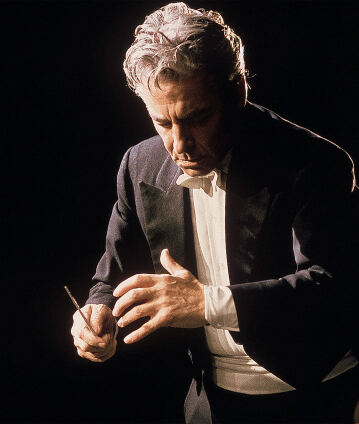Karajan conducts Beethoven’s Symphonies Nos. 2 and 8

For many years, Beethoven’s Second and Eighth symphonies were regarded as more minor works in the cycle of the nine symphonies. Due in no small part to Karajan’s decisive, clearly structured interpretations with the Berliner Philharmoniker made in the 1960s, the importance of these symphonies in Beethoven’s œuvre was clearly demonstrated. The present performances from 1971 were documented as studio recordings.
Herbert von Karajan first conducted Beethoven’s Second Symphony in Trieste in 1947. It was the last of the nine symphonies to enter his repertory, as was often the case in an era when Beethoven’s two early symphonies were seen as prefatory to the larger business of the Nine. The symphony itself is something of a paradox: a sunny, rumbustious piece in the ceremonial key of D which Beethoven completed in the autumn of 1802 at the same time as he was writing his “Heiligenstadt Testament”, the great confessional statement in which he confronted the trauma of his growing deafness, contemplated suicide, and eventually rejected it. From the 1960s onwards, Karajan’s brilliantly articulated performances with the Berliner Philharmoniker never underestimated the importance of the work in the Beethoven canon.
At no time in his career was Karajan fooled by Beethoven’s jesting reference to the Eighth as “my little symphony”. The work, whose mood is both comic and epic, displays qualities of rhythmic drive and tonal grandeur that are every bit as commanding as those of the Bacchanalian Seventh. With his keen sense of theatre, mordant wit and passion for precision in rhythm, Karajan was one of the work’s finest interpreters. His first recording, made in Vienna in 1946, was described by Gramophone as “remarkable for its sense of Beethovenian power and humour”.
If the accounts of the Seventh Symphony which Karajan gave with the Berliner Philharmoniker glowed with a white heat, those of the Eighth were miracles of grace, fire and wit. These 1972 recordings of the Second and Eighth Symphonies were directed by Hans Joachim Scholz. They are films whose cameras follow the line of Beethoven’s musical argument with unusual clarity whilst at the same time providing a vivid yet refreshingly uncomplicated report on the work of the Berliner Philharmoniker and its chief conductor.
© 1972 Unitel
Artists
Our recommendations
- Concert, conversation and master class: Karajan conducts Beethoven’s Symphony No. 5
- Karajan conducts Beethoven’s Ninth Symphony
- Performance and conversation: Karajan conducts Dvořák’s Symphony No. 9
- Karajan conducts Tchaikovsky’s Symphonies Nos. 4–6
- Karajan conducts Brahms’s “German Requiem” in Salzburg
- Herbert von Karajan and Evgeny Kissin at the 1988 New Year’s Eve Concert